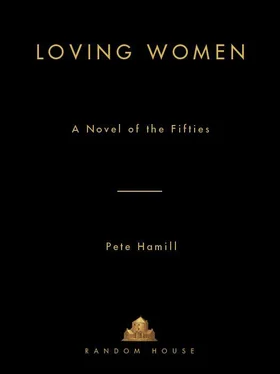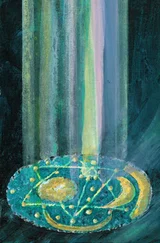“Ah preciate the comp’ny. Hey, you ain’t in no trouble now, are ya?”
“No. Why do you ask?”
“You don’t look too damned good .”
“Just tired. I’ll be all right when I get to where I’m going.”
“Won’t we all .”
He pulled over to the curb across the street from the bus station. I opened the door and got out.
“See you, bub,” he said, and then drove away, a crazy white man who listened to nigger music and thought Jews were weird. I took a breath and started across the empty street.
My heart stopped.
Two Shore Patrolmen in dress whites were standing in front of the newsstand. Their backs were to me. They were looking at the newspapers and I suddenly imagined myself on page one, along with Sal and Max and Maher and Dunbar, all of us charged with manslaughter. Bigger than our pictures was the photograph of the dead Marine.
I turned around and walked slowly away from there. Down the side streets. Left. Right. Left again. Expecting to see the Shore Patrol hurrying after me. Expecting a jeep to come screaming around a corner. Sweat poured down my face. My hands were wet. Up ahead, I saw a heavy black woman in a violet housedress come out on the porch of one of the houses. She had a yellow rag over her head and a cigarette clamped in her mouth. She was barefoot. I slowed down to a stroll, trying to look cool, as she bent over for a milk bottle. There was a cardboard sign in the window behind her. Rooms.
“Excuse me,” I said. “Which way’s the main drag?”
“You mean Gubmint Street?”
“The one with the big live oaks.”
“Ova yonduh. Bout three blocks.”
“Thanks.”
“Hey.”
“Yeah?”
“What the hell you doin roun heah?”
“Tryin to get to New Orleans.
“You look tebble.”
“Just tired.”
“You tahd, you betta sleep, white boy.”
“Gotta go.”
“Ah gotta room, you needs it. One dolla.”
She flipped the cigarette into the street.
“No, I better get to New Orleans.”
“Mah bruvva-in-low, he be goin that way this aftanoon …”
“Can I get a bath?
“That be a quota extra.”
I woke up soaked in sweat. I could see wallpaper peeling above me in the small cramped room. Beside the bed, a green painted bureau was greasy with heat. Old cooking smells hung in the air. I pushed my hand under the pillow. The wallet! I’d placed it there before falling off to sleep. Now it was gone. I sat up straight, my heart pounding. My clothes were draped over a chair. Then I looked at the door, thinking that I might be trapped here, locked in, my money stolen, like a traveler in one of those old fairy tales who went to spend a night at a country inn and ended up as meat pie.
I went to the door.
And sighed in relief.
It was open. I could see a landing and stairs going down to the first floor. I closed the door and got down on my knees to look under the bed. There was the wallet. The money was still inside. For a moment, the wallet and money had been the most important things in my life; now they seemed without any value. Now I would have to gather myself and start moving again. AWOL. Over the hill. Into the scary world.
Then there was a knock at the door and I jumped.
The door cracked open. I tensed.
And saw the black woman.
She had a large yellow towel for me and a pitcher of ice cubes and lemonade.
“Yo baff is ready,” she said. “Next door.”
“Thanks.”
“You look ready too,” she said and smiled.
“Your brother-in-law here yet?”
“Oh hell, boy, I dint mean you looks ready for him . I mean you looks ready fo, oh … somefin else.”
“I better just take a bath and go.”
“You sho?”
The brother-in-law’s name was Roderick. He was thin and knuckly and forty-two-years old and he had a load of pipe to deliver to Pascagoula. I didn’t know where Pascagoula was, but he sure did. And he wasn’t happy about going there.
“Anything I can do,” he said, “I stays outta Mississippi. They crazy ovuh there.”
“What about New Orleans?”
“Oh, that’s a different matter, all-to-gether. They crazy too. But crazy diffrunt .”
There was no radio in the one-ton truck, which Roderick said he’d bought as war surplus in ’46. We drove in silence through dark pine forest which gave way to groves of what Roderick said were pecan trees, drooping in the heat. We cut down a two-lane blacktop toward the Gulf. A breeze began to rustle the trees and I could hear a clacking sound. Roderick said it was the pecans. Smacking each other in the wind like a million castanets.
The sound of the pecans followed us most of the way to Biloxi. When we came into the town, Roderick said nothing. This was Mississippi and he damn well didn’t like it. Directly in front of us, planted in the middle of the highway, with the eastbound and westbound lanes swerving around it, was a giant whitewashed lighthouse.
“You think they planned this lighthouse this way?” I said.
Roderick laughed.
“Hell, no. This used to be the water . All this be landfill we drivin on.”
To the left now was the Gulf. Charter boats, docks, bait shops, food stores, souvenir places, a long crowded white beach that seemed to go for miles, and beyond the beach, out in the water, about five hundred shrimp and oyster boats riding at anchor. It looked like a postcard and I wished I could get out of the truck and enter the postcard and have a vacation the way ordinary people did. The streets were packed. Girls in bathing suits. Rednecks. Cops. Air force guys from Keesler. What looked like college boys. Their bodies were tanned and oiled and some of them were gliding in and out of the motels and all of them were white.
I looked at Roderick.
His eyes were fixed directly ahead of him on the slow-moving traffic.
Then the honky-tonks were gone and giant white mansions rose on a bluff: rich, smug, defiantly facing the sea. They all had tall white pillars holding up the roofs, like great houses in Civil War movies, and vast rolling lawns, and on the distant porches I could see tiny people in rockers watching the road and the ocean and the horizon. Biloxi vanished and Gulfport appeared, quieter, with a divided highway and palm trees and more grand houses, but no bait shops or charter boats or oiled blondes drifting to motels. I saw some odd-shaped trees. For the tung nuts, Roderick said.
“Years ago, buncha crazy peoples all tho’t they get themselfs rich wid de tung nut . Befo that, they tho’t the same wif the awnges . When I’se a boy, they’s awnge trees all up and down the damn coast. But the awnge trees died and so did the tung nuts. So now peoples still gotta make money the way they always done. Fum the damn Gulf. Fum the big blue water.”
Roderick drove quickly through Gulfport. The light was almost behind us and the Gulf looked large and scary. We could hear the ding-dinging of buoys and see the fishing boats cleaving through the water as if going to battle. Then up ahead we could see giant shipyard cranes rising off the flats, looking odd and disjointed against the lavender sky. Signs appeared, directing trucks with deliveries for the Ingalls Shipbuilding Corporation to make the next left. Roderick pulled over on a wide shoulder. Marsh grass swayed on both sides of the road. A sour smell rose from the baking earth.
“Ah don’t go no futhuh,” Roderick said. “You gotta git you the rest of the way to New Awlins on you own.”
“Thanks for the ride,” I said. I felt clumsy. He held the wheel with both hands. “It sure is beautiful country along here.”
“Yeah,” he said. “Yeah, it sho is.”
Читать дальше












